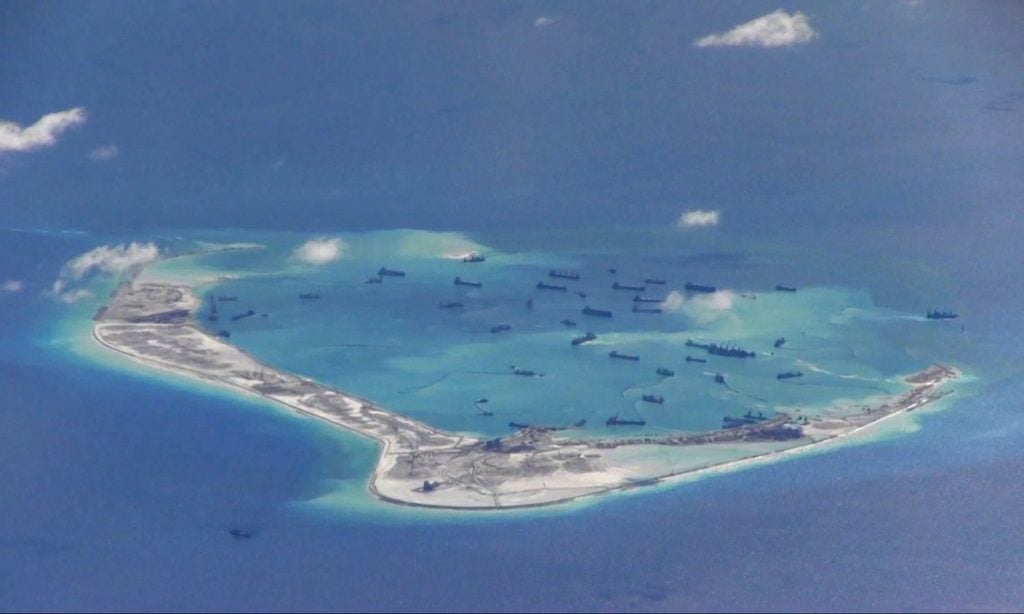
Image from a US Navy surveillance aircraft purportedly shows Chinese dredging vessels in the waters around Mischief reef in the disputed Spratly islands. (HANDOUT/Reuters)
On July 12, an international tribunal in The Hague issued a scathing rebuttal to China’s expansive claim under the nine-dash line, declaring it had no legal basis, and that any claims must be made on the basis of maritime entitlements from land features. Following the defeat, what has been Beijing’s reaction so far?
Before we consider China’s response, we need to further examine the court’s ruling and its implications. Firstly, Beijing’s claim of “historic rights” to the South China Sea were found incompatible with prevailing international law, as “there was no evidence that China had historically exercised exclusive control over the waters or their resources.”
Second, the court ruled Scarborough Shoal and those Spratlys that are above water at high-tide were rocks—and thus entitled only to a 12-nautical-mile territorial sea, not the 200-nautical-mile exclusive economic zones normally assigned to islands.
Of course, Beijing had never expected to win, having earlier raised objections regarding jurisdiction and admissibility, and arguing that sovereignty issues lay outside the mandate of the United Nations Convention on the Law of the Sea (UNCLOS) and its arbitral bodies. Beijing had also accused Manila of undermining previous negotiations by resorting to compulsory arbitration, although Manila believed all its diplomatic channels had been exhausted.
Naturally, Beijing’s reaction to the international tribunal’s ruling was defiant, declaring the verdict “null and void.” While the verdict is binding under Article 11 of the convention’s Annex VII, enforcement is another matter. Beijing is a signatory to UNCLOS, but has cited exemptions to arbitration over certain types of disputes permitted by Article 298 of UNCLOS as a way out of its responsibility to abide by the ruling.
Beijing’s truculence did not end with a refusal to accept Manila’s lawfare, however, for in the days following the ruling, Chinese coast guard vessels again resorted to blocking Philippine fishing boats from reaching Scarborough Shoal, which China seized from Manila in early 2012, after Washington insisted both parties vacate the area. The latest action came immediately after the tribunal scolded China for violating the traditional fishing rights of Filipinos by not allowing them to fish at the shoal.
In another show of defiance and strength, China began a three-day naval drill on July 19, declaring a no-sail area southeast of its island province of Hainan to conduct the drill. The drill coincided with the visit to China of U.S. Chief of Naval Operations Admiral John Richardson, who had been warned by Chinese admiral Sun Jianguo, the day before his arrival, that any U.S. freedom of navigation exercises “could even play out in a disastrous way”. During the talks in Beijing, Richardson was also warned by the head of the Chinese navy, Wu Shengli, that China would continue to reclaim land as part of China’s efforts to bolster its claims over the Nansha Islands (the Spratlys).
Finally, Chinese planes took to the sky, as two civilian aircraft landed on new airstrips built on Mischief Reef and Subi Reef, both of which are disputed features. China’s air force also sent its H-6K strategic bombers, along with fighter aircraft, scouts and tankers to patrol the disputed islands (including Scarborough Shoal), while announcing China “will continue to conduct combat patrols on a regular basis in the South China Sea.”
All of the above responses by Beijing to the ruling out of The Hague have only heated up the waters in the South China Sea and also flamed nationalistic pride on the mainland. Chinese and international media report protests broke out in at least 11 Chinese cities and rural counties calling for a boycott of American, Japanese and South Korean products. The protesters were targeting such American companies as Apple, Starbucks, McDonalds and KFC (despite Colonel Sanders having no apparent U.S. military role). One Chinese company, Hangzhou Bina Industrial Technology Company, even issued a “Patriotic Notice” to its 50 employees, warning them not to purchase the yet-to-be released iPhone 7, or they will be fired.
A poll taken after the protests showed that some 40 percent of the 144,000 polled support the protests were in favor of citizens expressing their patriotism in this fashion. Beijing will need to careful to tone down the nationalist rhetoric, lest they scare away foreign investment, and incite Chinese citizens to demand stronger military aggression in the South China Sea. A commentary on state-run Xinhua News Agency argued the people have a right to express their anger, but “Any sensible person would not equate patriotism with attempts to inflict losses to their compatriots.”
But will Beijing be successful in controlling the nationalistic rhetoric, or to borrow a phrase from Mao Zedong, could the ruling from The Hague be “the single spark that starts a prairie fire?”